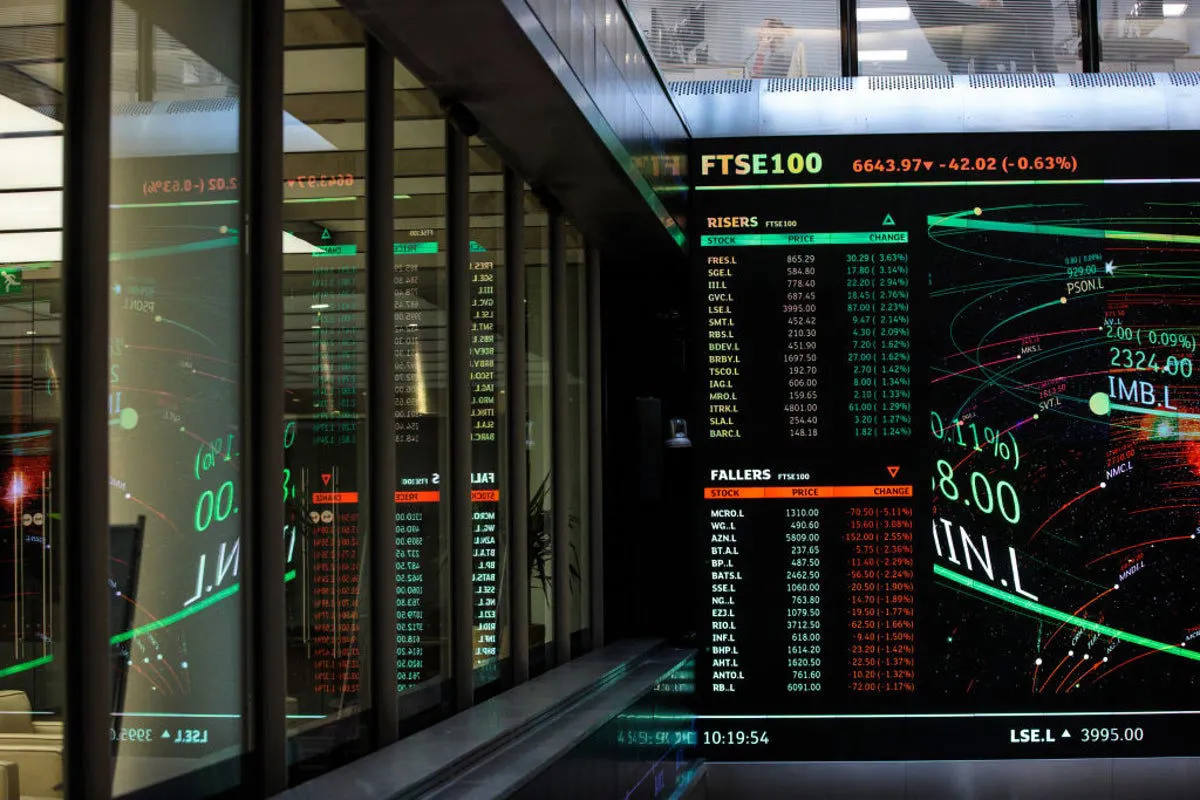Business
FTSE 100 Reaches Record Global Investors Return to London

The FTSE 100 has surged to a historic high, signaling renewed confidence among global investors in London’s financial markets. After a period of volatility caused by inflation, geopolitical tensions, and interest rate uncertainty, the index has rebounded strongly, surpassing its previous record and restoring optimism about the strength of the British economy. Analysts say the rally reflects improving investor sentiment, steady corporate earnings, and London’s continued role as a global hub for financial activity.
The Market Rally and Economic Drivers
The FTSE 100 reached a new peak this week, driven by strong performances across energy, banking, and technology sectors. Blue-chip companies such as Shell, HSBC, and AstraZeneca posted higher-than-expected earnings, reinforcing investor confidence in the resilience of UK-listed firms. The index’s growth has also been supported by a global shift in investment strategies, as fund managers seek stability and value in developed markets after a turbulent year for emerging economies.
Economic indicators have contributed to the positive momentum. Falling inflation, improving consumer confidence, and signs of economic recovery have created a favorable environment for equity investment. The Bank of England’s recent decision to maintain interest rates has reassured markets that monetary policy will remain stable, reducing fears of sudden tightening that could have disrupted corporate financing.
Investors have also responded positively to government initiatives aimed at boosting business confidence and attracting international capital. The Treasury’s ongoing reform of financial regulations, designed to streamline listing requirements and encourage innovation, has been particularly well received. Officials hope these measures will help reverse the trend of companies choosing to list overseas rather than in London, restoring the capital’s reputation as one of the world’s premier financial centers.
Market experts attribute the FTSE 100’s strength to its global diversity. Many of the index’s largest firms derive the majority of their revenue from international markets, which has insulated them from domestic economic headwinds. Energy prices have stabilized, commodities have recovered, and global trade has shown signs of revival, all of which have supported the index’s upward trajectory. The result is a market that, while cautious, appears more confident than at any point since the pandemic recovery began.
Global Capital Returns to London
The resurgence of the FTSE 100 is being mirrored by renewed international interest in UK assets. Data from the London Stock Exchange shows a sharp increase in foreign investment inflows, particularly from North America and Asia. Hedge funds and institutional investors are once again viewing the UK as a strategic opportunity, citing relatively low valuations and high dividend yields compared to other major markets.
The return of global capital has been facilitated by London’s unique strengths as a financial ecosystem. Despite the challenges of Brexit, the city remains a leading hub for banking, insurance, and asset management. International firms continue to use London as a gateway to European and global markets, attracted by its deep liquidity and regulatory sophistication. The pound’s relative stability and the Bank of England’s cautious monetary stance have further enhanced investor confidence.
Financial analysts highlight that London’s recovery is not only a story of short-term gains but also of structural renewal. The government’s push to strengthen the capital markets through the Edinburgh Reforms and the introduction of digital asset regulation is beginning to show results. These reforms aim to modernize the financial system, attract tech-driven firms, and position the UK as a global leader in sustainable finance.
In addition, the growing influence of green finance has drawn investors seeking exposure to renewable energy and environmental innovation. Several FTSE-listed firms are at the forefront of the global sustainability movement, reinforcing London’s appeal to long-term institutional investors focused on environmental, social, and governance principles. The rise of ESG-linked funds and sustainable investment portfolios has deepened the capital’s integration into the global financial network.
Challenges and Market Outlook
While the FTSE 100’s record-breaking performance has been widely celebrated, experts caution that challenges remain. Economic growth in the UK is still modest, and household budgets continue to face pressure from elevated living costs. Moreover, uncertainty surrounding global trade relations and geopolitical risks could still affect market sentiment.
Investors are also watching closely for signals from the Bank of England regarding future rate adjustments. Although inflation has cooled, policymakers remain wary of declaring victory too soon. A premature shift in monetary policy could disrupt bond markets and weaken investor confidence. Nevertheless, the consensus among analysts is that the FTSE 100’s fundamentals remain strong, supported by robust corporate balance sheets and international diversification.
Market strategists predict that the next phase of growth will depend on how effectively the UK can sustain investment flows and attract new listings. The government’s efforts to make London more competitive in the post-Brexit landscape will be crucial. If successful, these reforms could encourage a new generation of global technology and finance firms to choose the city as their base of operations.
Private equity activity and merger trends also point to sustained interest in UK assets. Several high-profile acquisitions of British companies by overseas investors underscore the perception that London remains undervalued compared to other major markets. As global liquidity improves and interest rates stabilize, analysts expect further capital inflows that could propel the FTSE 100 to even greater heights in the months ahead.
Conclusion
The FTSE 100’s record-breaking rise marks a significant milestone for the UK economy and reaffirms London’s enduring importance in the global financial system. As international investors return with renewed enthusiasm, confidence in British markets appears to be rebuilding after years of uncertainty. The combination of steady policy, strong corporate earnings, and forward-looking reforms has helped the capital reassert its place as a center of global investment.
While challenges remain, the long-term outlook for London’s markets is increasingly positive. The renewed flow of global capital signals that the city’s resilience, adaptability, and innovation continue to define its success. For now, the FTSE 100’s historic climb stands as a testament to the enduring strength of Britain’s financial heart.






















